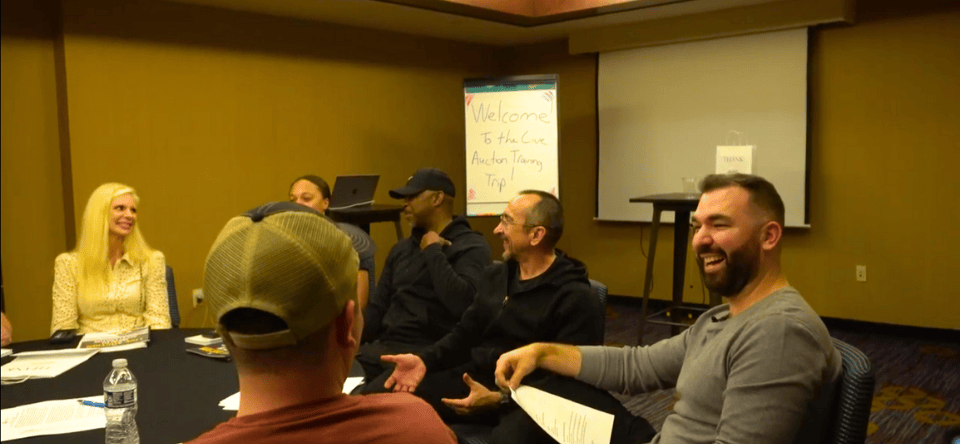Last Updated on September 9, 2025
Table of contents
- Yoda’s Wisdom for Tax Lien Investors: Rest, Patience and Doing
- Why is rest important when investing in tax liens?
- What does Yoda’s advice teach us about patience in real estate?
- How can deep breathing help you stay calm during tax auctions?
- How do we overcome excuses and start investing?
- Action table: Turning challenges into progress
- Frequently Asked Questions
- Conclusion and call to action
Yoda’s Wisdom for Tax Lien Investors: Rest, Patience and Doing
“Do or do not. There is no try.” – Yoda
When we invest in tax liens and deeds, this famous line from Star Wars isn’t just entertainment — it’s a reminder to commit fully to our goals.
After feeling the onset of a cold, we paused the hustle, watched the original Star Wars trilogy and let our body recover. Taking time off might feel indulgent, but research shows it is essential. A study referenced by the American Institute of Stress reported that 40 % of workers describe their job as very or extremely stressful, and 30 % of full‑time employees work on weekends and holidays. Lost productivity from poor mental health costs roughly US $1 trillion each year. Rest isn’t laziness; it is an investment in your ability to think clearly and make sound decisions.
Below we explore why rest, patience and decisive action are essential for successful tax lien investing, drawing on Star Wars metaphors, breathing science and proven real‑estate strategies.
Why is rest important when investing in tax liens?
Consistent work without breaks can lead to burnout. Your body and mind need time to recharge, and short breaks can help you manage stress more effectively. According to a health‑wellness article, micro‑rest periods — 30 seconds to five minutes of stretching, walking or even getting a cup of coffee — can make a significant difference in your productivity. The same article notes that letting your brain “incubate” ideas gives you a fresh perspective.
In our own experience, doing absolutely nothing for a weekend while fighting a cold sped up recovery. Instead of forcing work, we allowed the body to rest, watched a film and returned on Monday refreshed. As investors, we often pride ourselves on pushing through, but deliberately scheduled downtime helps us stay sharp during auctions and research.
What does Yoda’s advice teach us about patience in real estate?
When Luke Skywalker trained with Yoda, he struggled with impatience. Yoda’s mantra — “Do or do not…” — underscores the importance of commitment. Real‑estate investing is not a get‑rich‑quick scheme. Successful investors know that tax lien certificates often take months or years to mature, and due‑diligence research is non‑negotiable.
Patience is the most critical trait for investors, as highlighted in our detailed guide on the #1 trait you need to succeed . Returns can take one to three years, and redemption periods vary by state. By consistently checking property lists, calling county offices and attending sales, you build knowledge and avoid costly mistakes.
In short, Yoda’s lesson is to commit fully and remain patient. Rather than “trying” tax liens as a side project, build routines and stick to them until you see results.
How can deep breathing help you stay calm during tax auctions?
Stress is inevitable when bidding at auctions or managing a growing portfolio. Fortunately, breathing is one of the few bodily functions we can consciously control. A news article from the American Heart Association explains that deep, slow breathing stimulates the parasympathetic nervous system, which lowers heart rate and encourages the “rest and digest” responseheart.org. When we breathe slowly, blood vessels dilate and more blood flows to the gut, while controlled breathing can calm nerves by stimulating the vagus nerveheart.org.
In practice, when you feel overwhelmed at an auction, pause and take ten deep breaths. Inhale slowly through the nose, exhale through the mouth. This simple ritual resets your nervous system and sharpens your focus. Research also shows that people who used a handheld breathing device for 30 breaths daily over six weeks lowered their systolic blood pressure by 9 mmHgheart.org.
Breathing exercises cost nothing and can be done anywhere — they are a powerful tool in your investing toolkit.
How do we overcome excuses and start investing?
It’s easy to come up with reasons why you “can’t” invest. Maybe you think you lack money, time or knowledge. Yet by writing down each excuse and brainstorming solutions, you train your brain to look for ways forward instead of obstacles. For example:
- Excuse: “I don’t know how to pick good properties.”
Solution: Read our guide on picking properties for tax deed sales to learn how to build a list, set a budget and check redemption periods. Then attend a local auction to observe before bidding. - Excuse: “I’m worried about long redemption periods.”
Solution: Study your state’s redemption laws and invest in jurisdictions with shorter redemption periods or higher interest rates. - Excuse: “I don’t have cash on hand.”
Solution: Start small. Many successful investors began by purchasing inexpensive liens and reinvesting the returns over time.
This problem‑solving exercise strengthens your decision‑making muscle. Real estate inevitably presents challenges, but proactive planning helps you navigate them.
Action table: Turning challenges into progress
| Challenge | Action Step | Benefit |
| Feeling overwhelmed | Pause, take 10 deep breaths | Calms nerves, lowers heart rateheart.org |
| Fear of investing | List your excuses and brainstorm solutions | Shifts mindset toward solutions |
| Lack of patience | Learn state redemption periods and plan timeline | Aligns expectations with reality |
| Unsure how to start | Build a property list and visit auctions | First‑hand experience builds confidence |
Each small action compounds over time. As Yoda might say, the path to mastery is built on daily habits.
Frequently Asked Questions
Most counties hold tax deed or tax lien auctions several times each year. Schedules vary widely, so check your county treasurer’s website or our auction calendar for dates. Some jurisdictions offer online auctions, while others require in‑person attendance.
Tax lien certificates earn interest rates set by each state, often between 6 % and 24 %. Tax deeds let you acquire property outright but may require rehab or legal work. Returns depend on due diligence, redemption rates and market conditions. Always research local laws before bidding.
No. Many counties allow out‑of‑state investors, especially for online auctions. However, each state has different rules for redemption periods, bidding processes and payment methods. Review these details or consult an attorney before participating.
Our site offers a comprehensive knowledge vault and weekly videos. You can also schedule a free call to discuss your goals and get personalized guidance. See the call‑to‑action below.
Conclusion and call to action
Investing in tax liens and deeds requires rest, patience and decisive action. Like Luke training with Yoda, we must embrace the journey: take breaks when needed, develop patience through research and practice, and commit fully to our goals. Deep breathing and mindset exercises are simple tools that keep us centered when challenges arise.
Ready to take your first step? Explore our free resources or book a free call to get hand‑holding support toward your first deal. We’ll guide you through building your property list, understanding redemption periods and bidding confidently. Remember, the best time to invest was yesterday; the second‑best time is now.
About the authorWe are a team of tax lien and deed investors with over 22 years of experience, completing hundreds of deals across multiple states. Our mission is to help new investors buy tax deeds up to 90 % below market value and earn competitive returns. Through our blog, videos and coaching programs, we provide straightforward advice, real examples and step‑by‑step support. You can follow our work on YouTube for regular updates or explore our site for more in‑depth guides.









